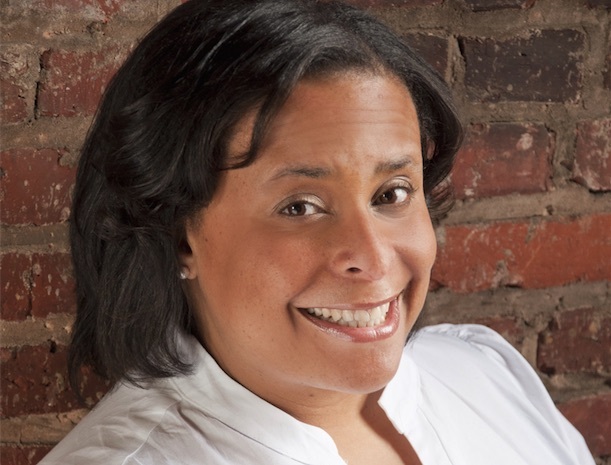
This month, OrchKids is getting its first boss. Raquel Whiting Gilmer—a Baltimore native who most recently was an executive vice president at the educational organization Learn It Systems—will take the helm as executive director. Serving more than 1,000 students at six public schools, OrchKids hosts during- and after-school programs in some of Baltimore’s poorest neighborhoods. We talked to Gilmer about her own musical background, her plan for OrchKids, and why she loves the theme song from Rocky.
It seems like your new position with OrchKids touches on your own background here in Baltimore.
RWG: Growing up in Baltimore, I had a lot of the same economic challenges that the students who are in the program experience. I knew what it meant to have my world opened up with music and opportunity from the hard work of my mother. It’s just something that I want to be part of. The skills and discipline that they’ll develop will not only help them if they decide to continue in the orchestral field, but it will also help them in their life. The practice, the succeeding after hard work, these are important principles they gain from this program.
You grew up playing the clarinet and piano.
RWG: I did. I played the piano longer than the clarinet. I stopped the piano when I went to college, and I regret that. I tell my husband, who’s a bass player, ‘I want a family band one day so I’m going to have to get back to my music.’
How were you introduced to music?
RWG: Music has been part of my family for generations. I’m an only child and my mom worked three jobs to make sure I had lots of different opportunities, and one of those was buying me a piano and making me take lessons. Even though financially we didn’t have a lot, my mom always made sure I had music, and that’s from the tradition of her own grandmother growing up in St. Mary’s County. I grew up in West Baltimore, mostly on the county side. But, in my early years, I was around Springdale [Avenue], and we lived not far from Leakin Park for a number of years.
And you attended private school, right? You must have had quite a unique perspective coming from West Baltimore.
RWG: My mom felt like she wanted to make a sacrifice to send me to Roland Park Country School. The students and faculty at Roland Park were incredible. I was offered a scholarship—if I wasn’t offered a scholarship, even working three jobs, my mom wouldn’t have been able to pay for it. One of the things they instilled in us was to be our very best, and I do feel like, what kind of opportunities can we provide for students across our city where they can be their best? I’m excited about offering lots of opportunities to students who are in our public school system. That’s what OrchKids is all about—making the world bigger for our students and providing access in areas where, traditionally, they were not available. When I think about my life, I think about having that foundation from my mom and understanding that I could do anything I wanted. I think that’s led to a lot of the successes I’ve had professionally. No matter what my economic situation was like at home, I just felt like I could do whatever I wanted to do.
How would you say that music change your life?
RWG: Learning that, unless I practiced and put the time in, I didn’t do well. Really seeing that that was something that helped me be driven and focused in my professional and personal life, understanding that, if I want to do well, I have to put my time in—whether that’s a new job, in school, going from college to law school and realizing it was difficult but I had done this before.
Also, I always tell people that you need a soundtrack in your life, and your soundtrack needs to motivate you—whether you’re at the gym and you’re trying to finish your workout, or when I’m preparing for a big presentation, I listen to inspirational music. You’re going to laugh at this, but I love ‘Gonna Fly Now’ from Rocky when I’m preparing for something. Music played a huge role—whether it’s what I learned from music, or how it makes me feel.
What kept you here in Baltimore?
RWG: I left for a while, for college [at Princeton University], then law school at the University of Virginia. I moved back 10 years ago because I wanted to come here and make a difference. I started a division and was regional manager of Educate Inc. that was offering free tutoring for students in Title I schools, and the technology so that tutoring could happen at home. I wanted to invest back in a community that’s given me a lot.
You’re coming to OrchKids at a time when arts education is being cut from schools across the country.
RWG: It’s critical for us to keep music and the arts available to our students. It’s going to help them in so many different ways. Obviously, there’s a focus on reading, writing, and math, which I think are absolutely necessary, but the skills that are developed through music [are as well]. When you practice a new piece, and at first you’re really bad at it, but you keep working on it, and eventually you’re able to play it at a recital, those are incredible lessons. It’s like nothing else that you can do. I remember hearing one student talk about how she saw other students playing more complicated pieces, and she thought, ‘I’ve got to get there.’
Students in the program get instruments, which is huge. I was at a meeting once where [Rep.] Elijah Cummings spoke, and said he always wanted to be in the band, but he didn’t have an instrument. The fact that we provide mentorship and academic tutoring, too, and all of this is free to families is incredible. And they have opportunities, whether that’s performing or going to competitive camps like Interlochen. Those are all opportunities that, without OrchKids, would not be available for students and families.
As the first-ever executive director, what will your role be like? Have you given yourself any particular goals?
RWG: My first step is to gauge what’s working really well and see how we can expand on that. I really feel like my role will be a lot about partnerships, and building them within the music and symphony community, as well as Baltimore, the school district, businesses, and community groups. There are so many people in Baltimore who are committed to making sure our students have a great life, and that they have great opportunities. There are a lot of obstacles, and unless we all work together we’re not going to get there. We want to expand the program into more communities, so that’s something I’ll focus on a lot.
I’m coming in to a great situation where there are incredible staff members, some of whom have been working with the program since the beginning, and an amazing relationship with the BSO and music director Marin Alsop. They’ve gained the trust of the communities where we’ve worked. Programs come and go in the city for various reasons like budget cuts, but the fact that OrchKids has been around for eight years, has been extremely successful, and has continued to grow is incredible. The community knows that OrchKids is there, that they’re going to continue to be there, and that they’re committed to making the students successful.
What do you see as some of its successes and challenges?
RWG: I don’t know that I have a great answer for that since I haven’t started yet, but from what I’ve seen, the successes are the students. There was a YouTube video uploaded of the students playing an original composition that they’d written, and after they were finished, Yo-Yo Ma started riffing off of it and playing with them. Each year we have more students going to the Baltimore School for the Arts, which may not have been on [the students’] radar before OrchKids. Another success is that the BSO has been such a great supporter of the program, and the donors are such generous people that get what we’re doing, they get that this is transformational and they want to invest in it. We’re going to have to expand our circle of funders and supporters, but I don’t see that as a challenge as much as an opportunity.
When you look down the road five to 10 years, what would you like OrchKids to look like?
RWG: Marin always says that she wants to be in every single neighborhood in the city, for OrchKids to touch every community. I would echo that, that at the very least, in five to 10 years we’re impacting all the communities in our city, no matter what that looks like.
Why is OrchKids such a good fit for Baltimore?
RWG: One of the things that OrchKids brings is this promise of what can be. Our students and families need that a lot. They need to see instruments in their school, they need to see performances of varying genres, and they need to see something that is hopeful.
Baltimore is a great city; I love this city. I remember going to one of our sites and seeing the kids playing, and when you saw the outside neighborhood, you wouldn’t necessarily imagine that you were going to go in and see this program. It’s amazing. Music really is transformational for the larger community, whether they go to concerts or they see a student walking down the street with a tuba.
